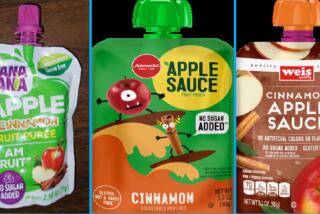Arsenic levels in some apple, grape juices may be high, report finds
Arsenic levels in some commercial fruit juices may be higher than expected, finds a study from Consumer Reports.
The discovery comes just months after television host Dr. Mehmet Oz proclaimed results from his own investigation showed that arsenic levels in apple juice were unhealthful. The Food and Drug Administration claimed OzŌĆÖs statistics were faulty and said juice was safe to drink. Apple juice contains a certain amount of organic arsenic, and what Oz found, they said, represented the total amount of arsenic and wasnŌĆÖt an accurate reading.
The Consumer Reports study noted that there is no federal arsenic limit for juice and most other foods, but there is one for bottled and public water: 10 parts per billion. For lead the threshold is 5 ppb.
Oz may feel vindicated. The Consumer Reports study tested 88 samples from 28 apple and three grape juices from various lots numbers that were packaged in various ways, such as ready-to-drink bottles, concentrate and juice boxes.
About 10% of the samples (five apple juice and four grape juice samples) had total arsenic levels higher than the 10 ppb standard for water. Arsenic levels in apple juice ranged from 1.1 to 13.9 ppb, and in grape juice it was 5.9 to 24.7 ppb. Lead levels at or above the 5 ppb limit were found as well in a quarter of all juice samples.
Apple juice brands that had at least one sample with more than 10 ppb of arsenic included Apple & Eve, Great Value (Walmart) and MottŌĆÖs. Grape juice brands with that amount included at least one sample from WalgreenŌĆÖs and WelchŌĆÖs.
Most of the arsenic found was inorganic, and the study speculates that sources could come from tainted soil. Although insecticides containing lead and arsenates have been banned in the U.S., the toxic substance may still be around. The study also notes that some companies use apple juice concentrates from countries such as China where arsenic-tainted soil could be a problem as well.
A statement from the Juice Products Assn. called juice safe for all consumers and said the industry ŌĆ£adheres to FDA guidelines and juice products sold in the U.S. meet and will continue to proactively meet or exceed the federal standards.ŌĆØ
Although in September the FDA said it was considering setting a standard for arsenic levels in fruit juice, the report urges federal officials to set total arsenic limits in apple and grape juice, and recommends a maximum amount of 3 ppb. For lead the recommendation is to at least meet the 5 ppb limit set for bottled water.
More to Read
Inside the business of entertainment
The Wide Shot brings you news, analysis and insights on everything from streaming wars to production ŌĆö and what it all means for the future.
You may occasionally receive promotional content from the Los Angeles Times.








